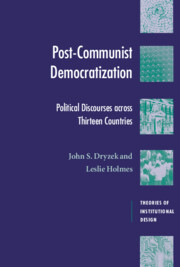Book contents
- Frontmatter
- Contents
- List of illustrations
- Preface
- A note on authorship credit
- Part I Introduction
- Part II Pre-transition countries
- Part III Halting transitions
- Part IV Transition torn by war
- Part V Late developers
- Part VI Trailblazers
- Part VII Conclusions
- 16 Differences that matter – and those that do not
- References
- Index
16 - Differences that matter – and those that do not
Published online by Cambridge University Press: 22 September 2009
- Frontmatter
- Contents
- List of illustrations
- Preface
- A note on authorship credit
- Part I Introduction
- Part II Pre-transition countries
- Part III Halting transitions
- Part IV Transition torn by war
- Part V Late developers
- Part VI Trailblazers
- Part VII Conclusions
- 16 Differences that matter – and those that do not
- References
- Index
Summary
It should be abundantly clear by now that the post-communist world is home to substantial variety – and a fair degree of national idiosyncrasy – in discourses of democracy. This richness suggests immediately that applying a one-size-fits-all template of what constitutes democracy is inadvisable, still less that such a template should be applied to the evaluation of democratic development across all countries. We can talk about the way democracy works and the prospects for democratization in countries such as Yugoslavia or Belarus without assuming that democracy can only be a matter of imposition of a standard liberal constitutionalist model. What democracy means and can mean varies substantially across different countries (this is no less true for more developed countries such as Germany, Britain, France, Italy, and the United States). Of course, crossnational similarities do exist – and we shall investigate patterns of similarity and difference in this chapter. Before turning to this comparative analysis, let us summarize the light we have shed on extant accounts of political transition in the post-communist world.
East and West: matters of degree
In chapter 1 we argued against applying a universal minimalist model of democracy to assessment of the progress of and prospects for democratic transitions. Such a model assumes no consequential differences between the kinds of democracy available in the West and East, or anywhere else. But it is equally mistaken to see post-communist democratization in sui generis terms (as proposed, for example, by Kaldor and Vejvoda, 1999).
Information
- Type
- Chapter
- Information
- Post-Communist DemocratizationPolitical Discourses Across Thirteen Countries, pp. 255 - 273Publisher: Cambridge University PressPrint publication year: 2002
